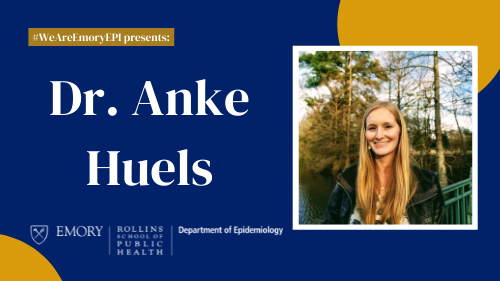#WeAreEmoryEPI: Meet Dr. Anke Huels
Category : #WeAreEmoryEPI
Meet Dr. Anke Huels! Dr. Huels is an Assistant Professor in our Department of Epidemiology whose research focuses on the development of epidemiological methods and their direct application to environmental and genetic epidemiology. Examples include the association between outdoor and indoor air pollution with human health, methods and applications for the detection of gene-environment (GxE) interactions, and current challenges in the analysis of DNA methylation data. Read more about Dr. Huels and advice she has for first-year MPH students below!
Tell us a little bit about your academic history/where you went to school.
I am originally from Germany, where I did my BSc, MSc and PhD in Biostatistics (TU Dortmund University). After that I completed a short postdoctoral fellowship in Epigenetics at the University of British Columbia (Vancouver, Canada), followed by a second postdoctoral fellowship in Genetic Epidemiology and Epigenetics in the Department of Human Genetics at Emory. In January 2020, I joined the faculty in the Department of Epidemiology as Assistant Professor.
How did you find the research that you are currently conducting?
During my last year of undergraduate studies, I learned about an institute in Germany that focuses on the health effects of air pollution. I was very fascinated by this research and its importance for public health and started to work as research assistant at that institute during my masters. This first research experience as a masters student has really shaped my interest in air pollution research, which is still the umbrella topic for most of my research projects.
Are there any exciting manuscripts or projects that you are currently working on?
I have the pleasure working on so many different project with my amazing trainees, that I don’t even know where to start. Maybe the most fascinating project I’m currently working on is one in which we are measuring DNA methylation and metabolomics in brain tissue to understand the biological response to air pollution (it’s at a very early stage though, so not exciting results to share yet).
What is your favorite part about being at Emory?
Definitely the amazing trainees! I love working with our amazing MPH and PhD students from Epidemiology, Environmental Health and Biostatistics! Having the opportunity to work with our wonderful trainees is inspiring and one of the best parts about being at Emory.
What advice do you have for MPH students?
Don’t be scared of reaching out to faculty! Please contact us, if you are interested in learning more about our research and are looking for thesis/APE/REAL opportunities. And don’t wait too long! I hate turning amazing students down, just because I don’t have any free slots left in late spring / early summer.
How have you been spending your free time?
I love to go hiking, especially in fall and winter when the temperatures have dropped but it’s still mostly nice and sunny outside.
If you currently live in the Atlanta area, what is one place that you would recommend people to visit?
Favorite hiking spots: Blood Mountain and Cloudland Canyon State Park (and Great Smoky Mountains of course)
What are three fun facts that you want your students to know about you?
- I don’t understand anything about football or baseball and don’t even understand the rules (I’m German, so I grew up watching soccer).
- I’m a first-generation college student and it took me a while to convince my dad that statistics is something worth studying.
- I grew up on a small farm in rural Germany (East Frisia).
It was great getting to know you, Dr. Huels! Stay tuned every Monday to see who we feature next on #WeAreEmoryEPI.
